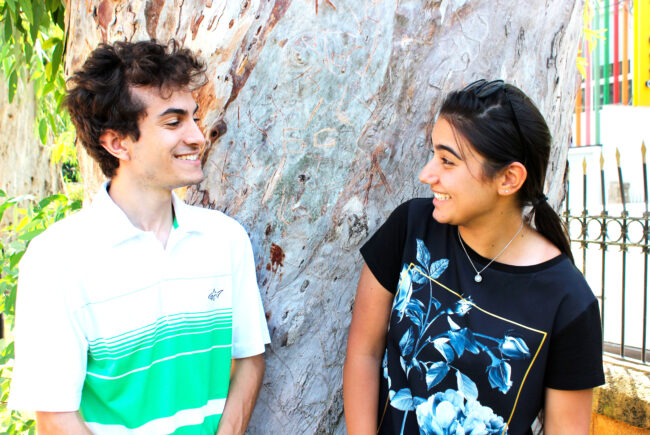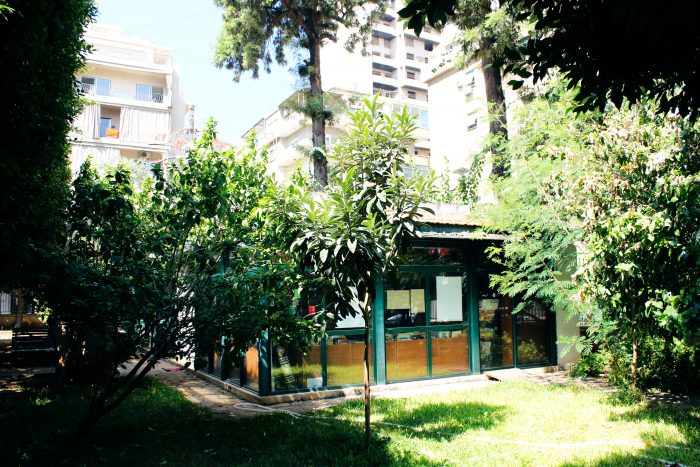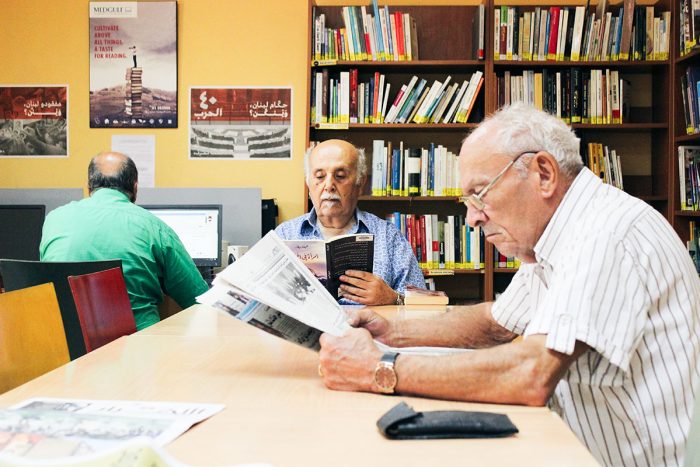

One of the public gardens in Beirut is called the Sanayeh Garden. Students Ibtihaje Chawki (right) and Mohamed Mokalled worked in the garden on a course work. They asked people for their opinions about the garden.
One of the public gardens in Beirut is called the Sanayeh Garden. Students Ibtihaje Chawki (right) and Mohamed Mokalled worked in the garden on a course work. They asked people for their opinions about the garden.
Beirut’s first municipal library was opened at the beginning of the millennium. In the libraries of Lebanon’s capital city there is a desire to promote not only lifelong learning but also equality.
Lebanon’s national library situated in Beirut was opened to the public about one year ago. On Saturday, there is a guard at the gate who says that the library is closed. The next possible time of entry is Monday morning.
University students Mohamed Mokalled and Ibtihaje Chawki are disappointed. For their coursework, they would have liked to interview people about the use of the library and the city’s public spaces. Because the library is closed, the students go to the neighbouring garden. Sanayeh Garden is open to all until 7 o’clock in the evening.
Although coursework can be done in the garden, the closed state of the library reminds them of the lack of open public facilities in Beirut. In Mokalled’s opinion, the lack of free space adversely affects people’s chances to educate themselves.
Libraries as meeting points
Beirut, which is home to more than 2 million inhabitants, has three municipal libraries. The first of these, Bachoura Library, was opened in 2001. Geitawi Library opened in 2004. The third of the libraries, Monot, was opened in 2008.
An organisation called Assabil is responsible for the activities of the municipal libraries. According to head of library work, Ali Sabbagh, a total of 30,000 people a year visit the three libraries. The number of visitors is still small and efforts are being made to increase it.
The people of Beirut do not easily pick up books. They think they will get the information that they need from the internet. The most challenging thing is to attract 14-22-year-olds to the libraries.
“People in that age group are not readers. This international phenomenon is also evident in Lebanon,” says Sabbagh.
Because young people do not read books, the library staff must think up something else for them. Rap music and photography workshops are organised for them. These are programmes that give them the opportunity to express themselves and to discuss.
Public libraries have otherwise increasingly begun to be thought of as meeting points; places that are open and free of charge for everyone and where people from different backgrounds can meet and learn from each other. With this in mind, the library staff organise 150 events every year.
In Lebanon, income disparities are amongst the largest in the world. Religiously speaking, Beirut is among the more diverse cities in the Middle East. Against this background, the need for open meeting places can be well understood.

The park is a great place for a library, as the library is then naturally surrounded by possible visitors. Librarians may also use the surroundings to organise events.
Linguistic activities in the library
Public libraries are also places for lifelong learning, continues Ali Sabbagh. The libraries organise film and debating clubs, poetry evenings and discussions about books. At the moment, topical subjects are gender equality and children’s rights.
Librarian Josiane Badra Azzi has been working at Geitawi Library for about 10 years. One of her jobs is to read to children on Saturdays at weekly storytelling sessions. The Assabil organisation has noted that if interest in books is aroused in childhood, people return to books later in their life.
Geitawi Library is situated in a public garden. Morning customers are mainly elderly people living nearby. One of the regular visitors, Daniel Shidrawi, heard about the library a couple of years ago and nowadays comes almost daily. When I ask about the use of the library for the purpose of studying, the 88-year-old is amused.
“I’ve been learning all my life. Now I only read for my enjoyment.”
It soon becomes clear, however, that actually the importance of the library from a learning perspective is great for Shidrawi. The retired engineer wishes to maintain and gauge his language skills. The library contains works in Arabic, French, English, Armenian and Spanish. Shidrawi has mastered four of these languages. He reads novels and biographies and spends three hours at a time in the library.
According to Badra Azzi, there is plenty of peace for reading and studying in Geitawi Library until around midday. Then children rush into the garden, and their playful voices can be heard in the library. Of the Assabil libraries, the one best suited to study is Monot. It is the most peaceful.

Naja Gharios (right) reading the daily papers at Geitawi Library. Daniel Shidrawi prefers novels and biographies.
In defence of public facilities in Beirut
Josiane Badra Azzi cannot say much about the future of her job. One year ago, the local municipality announced that a three-storey car park was going to be built on the garden. Because of that, the garden and library would be moved from street level to a higher floor. This change would be a pity, because the library is currently popular. In winter it has about 35 visitors per day and in summer about 60.
Maintaining public libraries is a defence of equality. As student Mohammed Mokalled says, in Beirut discussion about libraries is strongly linked to discussion about open spaces in general. A local library is a benefit merely for a few, but so is a local park or anywhere where you can spend time without paying for it. A quick glance at a map immediately reveals that, in Beirut, buildings are crammed together and green spaces are very few.
Urban planner and architect Abir Saksouk-Sasso studies and defends public spaces for her job. She says that, since the beginning of the 1990s, Beirut has been being developed at the cost of the public good. The city has been almost completely privatised.
Of the public parks, the largest is Horsh Beirut. Unlike public libraries, spending time in free natural spaces should be familiar to the people of Beirut. Horsh Beirut was already popular in the 1950s, but it too has not been able to avoid struggles to keep open. Once, by a decision of the local municipality, the park was closed for about 20 years. Thanks to activists, it was reopened. The area is fenced and, on weekdays, the gate closes at 2 a.m.
Saksouk-Sasso confirms that, in Beirut, it sometimes happens that a car park is built on a park. In her opinion, this development takes the chance of a healthy life from the majority of Beirut residents.
“Only the wealthy can enjoy an outdoor life.”
Voluntary workers needed by the libraries
Head of Assabil library work, Ali Sabbagh, says that people have to pay to enjoy a very large number of activities in Beirut. The city has, for example, plenty of lovely cafés where students sit in front of their computers, either alone or in groups. In public facilities, there would be no need to spend money, so more people would have access to them.
The organisation wants to extend library opening hours. At present, libraries are open from Tuesdays to Fridays, from 9 a.m. to 6 p.m. On Saturdays, opening hours are shorter. The organisation would like the Bachoura and Geitawi libraries also to be open on Sundays. For the extended opening hours, voluntary workers are being sought.
“In Beirut, it would be really important for public spaces to be open at weekends, especially in winter when people don’t have many places to go.”
The dream is to build a network of 12 municipal libraries in Beirut. The fourth library should have opened in 2016. The premises are lined up, but it has not been possible to begin library activities. According to Sabbagh, the local municipality decision-makers are considering whether the area needs health services more than cultural services.
On 17 October this year, the people of Lebanon took to the streets. The demonstrations are still going on. The common objective of the people is to rid themselves of the political system based on sectarianism, i.e. dividing up power based on religious denominations. They also have other demands, one of which is to get more public spaces, both in Beirut and elsewhere in Lebanon.
Author







